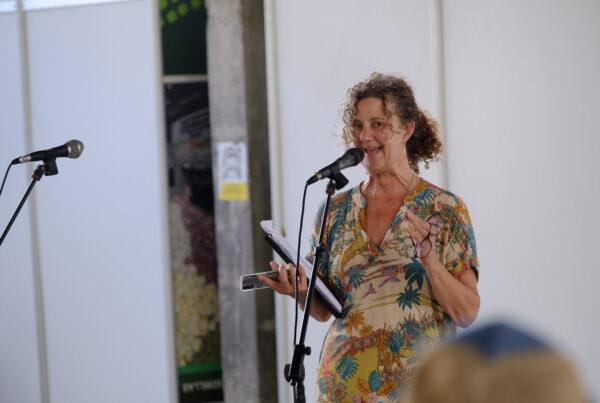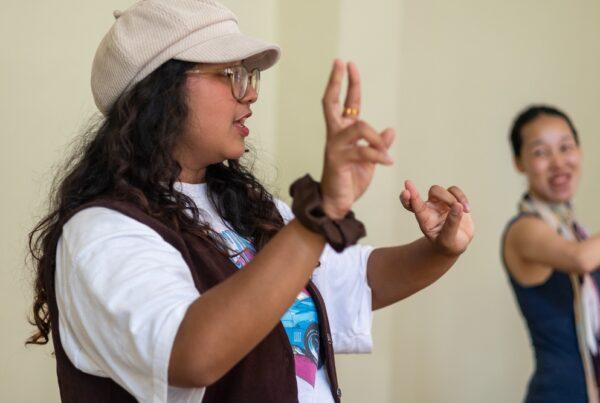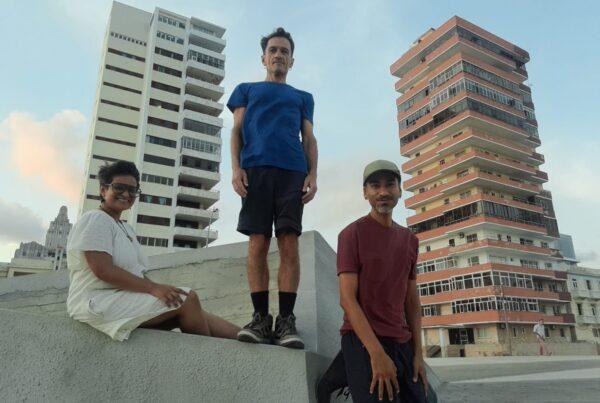10 case studies based on 10 different countries will be Selina Busby’s field of research until December next year. As an international comparative series of case studies exploring how children and young people access Theatre for Young Audiences, Busby will be looking at school curriculums and whether drama theatre performance is in the curriculum, whether schools run any extracurricular theatre classes if they don’t offer it within the curriculum, (this research will apply for primary, high school and university level education), as well as looking at private schools as independent entities.
“I’m unsurprisingly finding is that a lot of countries have no drama provision or very little drama provision in their timetable, but they might do extra curricular activities,” reveals Busby based on the research she has done so far.
Beyond looking at schools, Busby will also be looking at whether each country has a system of touring theatre that tours into schools so that young people can access it that way, rather than in the curriculum. “I’ll also be looking at what usage of provisions is available in each of the countries for young people to make theatre themselves, and I’ll also look at mainstream theatres, state funded or not, to see how they interact with young people with their programmes,” reveals Busby.
“Here I will look into wether they run particular programs for young people to see things, if they reduce ticket prices for people who don’t go to the theatre, or live in areas where there’s not many people doing that, if they run their own new theatres,” says Busby naming a couple of her research quieries.
 Identifying that her is task is boundless due to the fact that each city is different, each area is different and each country is different, her aim is to write a sound case study for each country regardless. In turn, these case studies will also enable her to bring out and focus on best practices, an additional outcome expected from her research. In her words, best practices would reveal “where the examples of really excellent education programmes that other people could learn from are, where do really excellent opportunities for young people to have their voices amplified through making their own theatre exist,” and so on.
Identifying that her is task is boundless due to the fact that each city is different, each area is different and each country is different, her aim is to write a sound case study for each country regardless. In turn, these case studies will also enable her to bring out and focus on best practices, an additional outcome expected from her research. In her words, best practices would reveal “where the examples of really excellent education programmes that other people could learn from are, where do really excellent opportunities for young people to have their voices amplified through making their own theatre exist,” and so on.
Practically speaking, Busby is carrying out research in places she has easy access to and which notably are geographically very different (countries included in her research range from India to Norway), and is currently not using ASSITEJ members to gather data so as to ascertain that she attains alternative voices. “I think it’s really important to look outside of ASSITEJ at the moment, at the last stage of the research, I will then contact ASSITEJ members and cross reference what I’ve found,” asserts Busby.
As an academic and theatre practitioner who makes performances with community groups as well as being a National Teaching Fellow, and a Professor of applied and social theatre at The Royal Central School of Speech and Drama, where she is also the Course Leader for the MA Applied Theatre course and the lead for Research Ethics and Integrity, Busby is also reaching out to her former students who are based in the countries she is focusing on. “I’ve got people on the ground in those countries who really know the systems and know what’s happening. So that’s where I’m doing a lot of work on the ground. I’m also interviewing theatre makers, teachers, young people, my research assistants and researching young people and how they feel about their access to theatre.
Busby highlights some of the examples she has come across so far. “There’s an informal housing settlement in Kenya that has about 100,000 young people and only two formal schools, and it has about 42 informal schools,” says Busby. “As far as I can tell, there’s only one drama practitioner, he’s a one man band, he’s amazing. He tries to go to as many of those schools as possible and offers workshops and practice. So I’ve got that sort of thing happening on one level, and then I have Norway, where the set up for schools is incredible, but then, when you look at what’s happening out of their schools, there’s not so much extracurricular activities… And then you’ve got the other extreme example, companies like the Donmar Warehouse theatre in London, which is a main stage theatre that regularly provides access to its building to over 5000 young people that are living right on its doorstep, which is not an affluent area at all, and so they’re working with them in their building, outside their building, they’re giving them theatre training on how to set lights because they don’t have theatre in schools, so the theatres are doing that,” says Busby, highlighting the diversity of realities she is unfolding. “So what’s emerging is that different countries have brilliant work happening, which isn’t a surprise at all, but so far I’ve not found anywhere that has it all,” says Busby.
 To this end, and based on her experience working in the field, Busby advocates for sound research in the field of TYA. “Research definitely has to be about bringing evidence of the impact of theatre on youth. I think that people who make work for young people, with young people are passionate about it, and they’re passionate about it because they can see the value it has on people’s lives. They can see the opportunities it gives them, how it raises their cultural capital…. It also brings fun, something that people don’t talk about very often. It brings fun to people’s lives when they’re living in excruciatingly unfunny places and really extreme, dour, depressing worlds,” says Busby. “It’s really hard to prove that (fun), so when you go to the UK Government for example, and say: why have you taken theatre out of schools and that it’s really important for young people’s social development, they’ll ask you to prove it to them. And what we’re not very good at as a field is that data, because they’re often only convinced by numbers, they want quantitative data as opposed to qualitative. But I genuinely think it has to be both. I think that when you get a politician in the room that sees the difference, you’ve got them,” attests Busby.
To this end, and based on her experience working in the field, Busby advocates for sound research in the field of TYA. “Research definitely has to be about bringing evidence of the impact of theatre on youth. I think that people who make work for young people, with young people are passionate about it, and they’re passionate about it because they can see the value it has on people’s lives. They can see the opportunities it gives them, how it raises their cultural capital…. It also brings fun, something that people don’t talk about very often. It brings fun to people’s lives when they’re living in excruciatingly unfunny places and really extreme, dour, depressing worlds,” says Busby. “It’s really hard to prove that (fun), so when you go to the UK Government for example, and say: why have you taken theatre out of schools and that it’s really important for young people’s social development, they’ll ask you to prove it to them. And what we’re not very good at as a field is that data, because they’re often only convinced by numbers, they want quantitative data as opposed to qualitative. But I genuinely think it has to be both. I think that when you get a politician in the room that sees the difference, you’ve got them,” attests Busby.
“The impact of theatre sometimes can be bring direct shifts in policymaking, which is really valuable..,” says Busby and she supports her claims with concrete examples. But merely saying that a young person feels valued and heard or seen, all of those things are really anecdotal, and so you need the numbers to go with anecdotal stories because the anecdotal stories move people’s hearts, and data moves people’s minds. And so we desperately need research in the field to bring those two things together,” she concludes.
Busby’s research on value of TYA is one of the 6 different projects being carried out on behalf of ASSITEJ International. More info can be found here.
Dr Selina Busby is an academic and theatre practitioner who makes performances with community groups as well as being a National Teaching Fellow. She is a Professor of applied and social theatre at The Royal Central School of Speech and Drama, where she is also the Course Leader for the MA Applied Theatre course and the lead for Research Ethics and Integrity. Her research and practice focuses on theatre that invites the possibility of change. She uses participatory and emancipatory research methods and has worked internationally in prison settings, youth theatres, and with people living in adverse conditions. Her research investigates applied theatre with marginalised communities undertaking partnerships with theatres, NGOs, youth groups, and grassroots practitioners. Current projects include work with communities living in informal housing settlements, those living with gender-based violence in India, and a cultural heritage project in Kenya. This latter project is focused on archiving African Rock Art in order to create a digital learning resource and drama package for schools in partnership with local practitioners and the UK-based company, C&T. Recent publications include Applied Theatre: A Pedagogy of Utopia (2021), Methuen, and The Routledge Companion To Theatre and Young People, co-edited with Kelly Freebody and Charlene Rajendran (2022), Routledge.

Melissa Hekkers is a freelance journalist and author.
Her most recent book, Amir’s Blue Elephant, a creative non-fiction based on her experiences working in the Moria refugee camp in Lesvos, Greece and Cyprus. In 2018, she launched the My Cyprus Mandala Series, colouring books inspired by the natural and cultural heritage of Cyprus. In 2007, she published her first children’s book in both English and Greek entitled Crocodile, which won the Cyprus State Illustration Award. In 2012, she launched her second children’s book Flying across Red Skies (in English and Greek), using an experimental approach to literature, for which she was nominated for the Cyprus State Literary award. Her third, similarly well-received children’s book was Pupa (Greek and English), published in 2014 and was adapted as a theatre play in 2019. In between her last two books, she published her first free-verse poetry book entitled Come-forth. In 2019 she was contributing author to the anthology Nicosia Beyond Barriers: Voices from a Divided City, published by Saqi Books, London.





